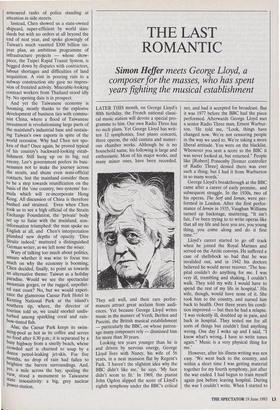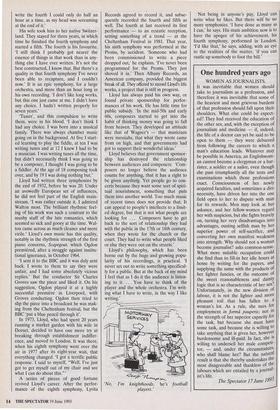THE LAST ROMANTIC
Simon Heifer meets George Lloyd, a
composer for the masses, who has spent years fighting the musical establishment
LATER THIS month, on George Lloyd's 80th birthday, the French national classi- cal music station will devote a special pro- gramme to him. Our own Radio Three has no such plans. Yet George Lloyd has writ- ten 12 symphonies, four piano concerti, three operas, the odd cantata and numer- ous chamber works. Although he is no household name, his following is large and enthusiastic. Most of his major works, and many minor ones, have been recorded.
They sell well, and their rare perfor- mances attract great acclaim from audi- ences. Yet because George Lloyd writes music in the manner of Verdi, Berlioz and Puccini, the British musical establishment — particularly the BBC, on whose patron- age many composers rely — dismissed him for more than 30 years.
Looking ten years younger than he is and driven by nervous energy, George Lloyd lives with Nancy, his wife of 56 years, in a neat mansion flat by Regent's Park. 'I haven't the slightest idea why the BBC didn't like me,' he says. 'My face didn't seem to fit.' In 1969, the pianist John Ogdon slipped the score of Lloyd's eighth symphony under the BBC's critical net, and had it accepted for broadcast. But it was 1977 before the BBC had the piece performed, Afterwards George Lloyd met a senior Radio Three man, Ernest Warbur- ton. 'He told me, "Look, things have changed now. We're not censoring people in the way we used to. We're taking a more liberal attitude. You were on the blacklist. Whenever you sent a score to the BBC it was never looked at, but returned." People like [Robert] Ponsonby [former controller of Radio Three] denied there was ever such a thing; but I had it from Warburton in so many words.'
George Lloyd's breakthrough at the BBC came after a career of early promise, and subsequent struggle. In the 1930s, two of his operas, The Serf and lemin, were per- formed in London. After the first perfor- mance of lemin in 1935, Vaughan Williams turned up backstage, muttering, "It isn't fair, I've been trying to to write operas like that all my life and here you are, you young thing, you come along and do it first time."' Lloyd's career started to go off track when he joined the Royal Marines and served on the Arctic convoys. He suffered a case of shellshock so bad that he was invalided out, and in 1942 his doctors believed he would never recover. 'The hos- pital couldn't do anything for me. I was very ill, trembling and shaking, I couldn't walk. They told my wife I would have to spend the rest of my life in hospital.' His wife, though, would have none of it. She took him to the country, and nursed him back to health. Over three years his condi- tion improved — but then he had a relapse. `I was violently ill, doubled up in pain, and back in hospital. They tested me for all sorts of things but couldn't find anything wrong. One day I woke up and I said, "I know what's wrong, I have to write tunes again." Music is a very physical thing for me.'
However, after his illness writing was not easy. 'We went back to the country, and within a short time I was getting material together for my fourth symphony, just after the war ended. I had begun to train myself again just before leaving hospital. During the war I couldn't write. When I started to write the fourth I could only do half an hour at a time, as my head was screaming at the end of it.'
His wife took him to her native Switzer- land. They stayed for three years, in which time he finished the fourth symphony and started a fifth. The fourth is his favourite. 'I still think I probably got nearer the essence of things in that work than in any- thing else I have ever written. It's not the best constructed, I know that. But there's a quality in that fourth symphony I've never been able to recapture, and I couldn't now.' It is an epic symphony, for a large orchestra, and more than an hour long in his own recording. 'I don't like long works, but this one just came at me. I didn't have any choice. I hadn't written properly for seven years.'
'Tunes', and this compulsion to write them, were in his blood. 'I don't think I had any choice. I was born into a musical family. There was always chamber music going on in the background. At five I start- ed learning to play the fiddle, at ten I was writing tunes and at 12 I knew I had to be a musician. I was writing tunes all the time, but didn't necessarily think I was going to be a composer, I thought I was going to be a fiddler. At the age of 18 composing took over, and by 19 I was doing nothing but.'
Lloyd had written three symphonies by the end of 1932, before he was 20. Under an avowedly European set of influences, he did not feel part of the English main- stream. 'I was rather outside it. I admired Walton most. The brilliant rhythmic feel- ing of his work was such a contrast to the mushy stuff of the late romantics, which seemed so sick and gooey at the time. Wal- ton came across as much cleaner and more virile.' Lloyd's own music has this quality, notably in the rhythmic strength of the first piano concerto, Scapegoat, which Ogdon premiered, after a struggle against institu- tional ignorance, in October 1964.
I sent it to the BBC and it was duly sent back. I wrote to them to say they were unfair, and I had some absolutely vicious replies.' But the conductor Sir Charles Groves saw the piece and liked it. On his suggestion, Ogdon played it at a highly successful premiere in Liverpool, with Groves conducting. Ogdon then tried to slip the piece into a broadcast he was mak- ing from the Cheltenham festival, but the BBC 'put a blue pencil through it'.
In 1973, Lloyd, who had spent 20 years running a market garden with his wife in Dorset, decided to have one more try at breaking through establishment indiffer- ence, and moved to London. It was there, when his eighth symphony went over the air in 1977 after its eight-year wait, that everything changed. 'I got a terrific public response. I said to myself, "Well, I've just got to get myself out of my chair and see what I can do about this."' A series of pieces of good fortune revived Lloyd's career. After the perfor- mance of the eighth symphony, Lyrita Records agreed to record it, and subse- quently recorded the fourth and fifth as well. The fourth at last received its first performance — to an ecstatic reception, setting something of a trend — at the Cheltenham Festival in 1981. That year, his sixth symphony was performed at the Proms, by accident. 'Someone who had been commissioned to write a piece dropped out,' he explains. 'I've never been programmed for the Proms. They just shoved it in.' Then Albany Records, an American company, provided the biggest break of all. They offered to record Lloyd's life works, a project that is still in progress.
Lloyd has always paid his own way, or found private sponsorship for perfor- mances of his work. He has little time for public subsidy. 'In the mid-50s and early 60s, composers started to get into the habit of thinking money was going to fall from heaven. They developed an attitude like that of Wagner's — that musicians were messiahs, that what they wrote came from on high, and that governments had got to support their wonderful ideas.'
Lloyd believes that government sponsor- ship has destroyed the relationship between audiences and composers: 'Com- posers no longer believe the audience counts for anything, that it has a right to be given anythin'g. Yet people go to con- certs because they want some sort of spiri- tual nourishment, something that puts them into another world. Too much music of recent times does not provide that. It can appeal to people's intellects to a limit- ed degree, but that is not what people are looking for . . . Composers have to get back to the sort of relationship they had with the public in the 17th or 18th century, when they wrote for the church or the court. They had to write what people liked or else they were out on the streets.'
Lloyd's philosophy, which has been borne out by the huge and growing popu- larity of his recordings, is practical. 'I never set out to write something specifical- ly for a public. But at the back of my mind I feel that as I do it the audience is listen- ing to it. . . . You have to think of the player and the whole orchestra. I'm writ- ing what I have to write, in the way I like writing.'
`No, I'm knighthoods, he's football players.' Not being in anyone's pay, Lloyd can write what he likes. But there will be no more symphonies. 'I have done as many as I can,' he says. His main ambition now is to have the apogee of his achievement, his fourth symphony, performed in London. `I'd like that,' he says, adding, with an eye to the realities of the matter, `if you can rustle up somebody to foot the bill.'



















































 Previous page
Previous page